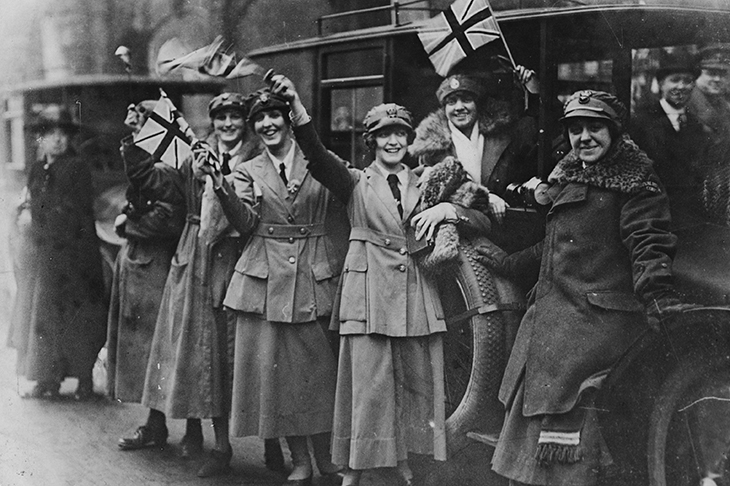Reflecting on the scenes of celebration, the ‘overpowering entrancements’, that he had witnessed in November 1918 on the first Armistice Day, Winston Churchill wrote that their memory was all too fleeting, and that the spirit of wild rejoicing that had erupted at the end of the first world war was in a sense irrecoverable.
Throughout Britain it had been a magical day, repeatedly described as ‘wonderful beyond words’. Yet the spontaneous outpouring of joy, intensified by sadness, the feelings of relief and brotherhood, together with the conviction of a better future, left no permanent legacy. Instead, across the century that now separates us from the end of the Great War, Armistice Day, and subsequently Remembrance Sunday, became associated with solemnity and silence, and respectful communion with the dead.
Guy Cuthbertson’s book aims to retrieve something of the excitement and pandemonium — as well as the sheer strangeness —of the British experience of the Armistice. Reading it is a bit like watching a day unfold in slow motion. It opens in a stationary railway carriage in the middle of a French forest at 5.12 a.m. GMT. Representatives of the Allies and Germany meet to sign a document bringing to an end 1,560 days of bloodshed, enshrining a victory for one side and a humiliating defeat for the other. Marshal Foch, resembling ‘an elderly ticket inspector on the Orient Express’, is the first to sign, on behalf of the French.
Meanwhile, in Birmingham, at eight o’clock, a white rainbow is visible, a perfect signal for the arrival of peace on what happens to be St Martin’s Day (commemorating the fourth-century soldier in the Roman army who refused to fight). A man on his way to buy his morning newspaper sees a flag tied to a child’s chair in a cottage doorway, as if waiting for the moment. Already boats on the Tyne are decked in bunting, their sirens sounding. By eleven that morning, when church bells start to peal, guns fire and maroons sound — causing some to panic in anticipation of an air raid — most people know that it’s ‘peace at last’, though in some places, Banbury for instance, news doesn’t reach the inhabitants until midday (and in London also, the bongs of Big Ben don’t strike until noon).
The Mayor tells the citizens of Chester that he leaves it to their consciences how they should behave, while the Prime Minister Lloyd George says that people are entitled to do ‘a bit of shouting’. However, the ‘very riot of unrestraint’ that follows, lasting until late at night, is unprecedented. There is yelling and singing, flag waving, dancing (Nelson’s Column is treated like a maypole), the lighting of bonfires and the burning of the Kaiser in effigy. Children are let off school — though not in Sheffield where some spoilsport orders that pupils be kept in all day.
But, as in the disturbing image from Louis Golding’s poem, the ‘Lady of Peace’ comes with her grief and ‘blood on her teeth’. Private George Ellison, killed on the outskirts of Mons at 9.30 that morning, was the last British soldier to die before the Armistice, and news of soldiers’ deaths continued to reach families as they were attending church services in thanksgiving for the peace.
The week of the Armistice also saw a sharp rise in the death rate for the flu pandemic that was sweeping the world. The celebratory crowds encouraged the spread of infection. Anthony Burgess’s earliest memory was of being lifted onto the shoulders of his mother or sister to see the flag-waving crowds in Manchester. Both women died from flu only days later.
Cuthbertson has worked hard in assembling his impressionistic picture from scores of first-hand manuscript and published accounts (it may be invidious to mention one major collection he’s missed, but it seems distinctly odd that he didn’t apparently consult the Liddle archive in Leeds). The result is often memorable and moving, though sometimes his more interesting conclusions — for example of the revolution-defying impact of George V being driven through the London drizzle on 11 November in an open carriage, ‘without cops’, as Ezra Pound put it — are lost in the monotony of the flag-waving. One can take only so much yelling and shrieking.
Cuthbertson makes a significant point about books like his, which are part of a by now established trend in looking at first world war history in terms of much more than just the military story. Among recent transnational developments are studies of the effects of the fighting on children and on captive civilians.
In light of this, Allan Mallinson’s month by month survey of the war may seem to fall into too familiar and conventional a mould. But Fight to the Finish is notable for its clarity, and anyone requiring a digestible narrative summary of the fighting on land and sea would be advised to start here. One thing disfigures the book and that is the author’s polemical conclusion, in which he attacks Christopher Clark’s The Sleep-walkers for having the temerity to argue that no nation, not even Germany, really meant to wage war in 1914. Given the extraordinary weight of scholarship that supports Clark’s work, Mallinson’s decision to play the old German-blame game — even to the extent of asking, whatever would Lady Thatcher have thought? — comes across as simplistic and banal.






Comments